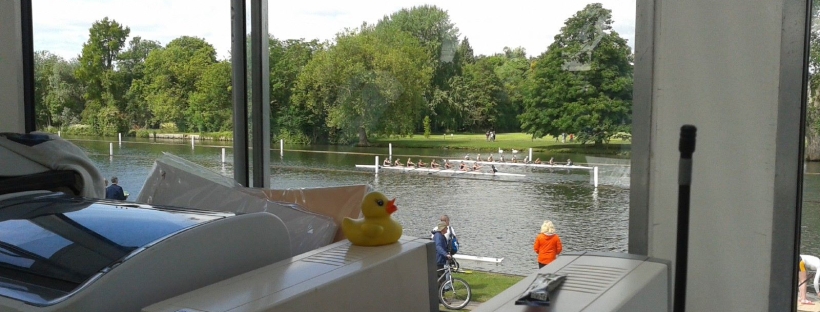This weekend would have been the 33rd Henley Women’s Regatta but like most other sporting events large and small this summer, it had to be cancelled because of the Covid-19 pandemic. It will be greatly missed by competitors, spectators and, some may be surprised to hear, the volunteers who run it.
For the young women who would have competed there, this precious opportunity in what are generally relatively short older junior and senior rowing careers has gone for ever. For us volunteers, it’s loss is less significant in numerical terms as we have mostly been doing our things there since many of the current potential competitors first grabbed a blade (or even their own toes) and will probably still be doing so too once they’ve raced for the last time over the iconic course.
But in other ways the three long days there each year are perhaps even more embedded in our lives, and are a much appreciated opportunity to spend time with our friends, enjoying making things happen together – in my case based at the central results caravan where I also get a FANTASTIC view of the racing, as shown at the top of this page.
So if you’re missing HWR this weekend as much as I will be, do take the opportunity to learn about the international rowing careers that some of the volunteers had with this selection of rowing stories and articles about key people and events that are strongly linked to the regatta (and if this looks boring, do scroll on as there are photos further down):
The very idea of HWR was conceived by Rosie Mayglothling, who rowed for GB from 1975 to 1982. She has made and continues to make a huge contribution to rowing and women’s rowing in particular, and in 2003 a group of her friends donated a trophy in her name, which is now awarded for the Aspirational Double Sculls.
While we’re on the subject of the trophies, read the stories of the W Peer Cup and the Frank V Harry Cup, named after two men who coached GB women’s crews at a time when men either wouldn’t coach women, or only did so as a ‘stepping stone’ to coaching men. The Frank V Harry Cup had originally been a trophy that was won at Brent Regatta in 1965 by United Universities WBC who had been the GB four or eight throughout the first half of the 1960s and donated it to HWR. One of these oarswomen was Pauline Churcher, who was also one of HWR’s founding group and presented the Bernard Churcher Trophy in her husband’s memory. She umpired at many of the early regattas too and served as Chief Umpire from 1995-1999.

Pauline Churcher has a ‘Marilyn Monroe moment’ whilst umpiring at an early Henley Women’s Regatta (raced downstream in 1988-1990). (Photo © John Shore.)
1974 international Chris Aistrop was HWR’s first Chairman. She held the role for less than a year as, having organised that 1988 regatta in less than six months, her job then posted her overseas.
Anyone at the regatta in recent years will have come across Entries Secretary Sue McNuff, who was in the GB team with Rosie at the 1980 Olympic Games in Moscow. In fact, that 1980 Olympic team has proved to be a bonanza for HWR volunteers, as Rosie’s crewmate Liz McVeigh now runs the Friends area.
All of these existing relationships are invaluable when you have to get a major organisation up and running in such short space of time; they mean we can bypass the norming, storming and forming, and go straight to performing!
Probably the most impressive set of performances that HWR will ever see was Sue Appelboom’s ten consecutive wins in lightweight single sculls from 1990-1999. As if that wasn’t enough in itself, the record which she set in 1992 stood for 25 years until it was finally broken in 2017 by Maddie Arlett, who is now a member of the GB team and won the bronze medal in the event at the World Championships last year.

- Sue Appelboom is presented with one of her HWR medals by Di Ellis (Deputy Chairman 1992-1993) watched by Di Graham (Chairman 1998-2012). (Photo © John Shore.)
While we’re on the subject of Chairmen, Di Graham was succeeded by Miriam Luke (neé Batten) who was in the first British Women’s crew to win an Olympic Medal (in the quad with her sister Guin, Katherine Grainger and Gillian Lindsay) at the Sydney Olympic Games in 2000.
Sign up here to be notified when Miriam’s rowing story is added to this site (quite soon!)
Miriam’s front of stage at the HWR prizegiving, which has a unique blend of celebrating such hard-to-come-by wins with a delightful informality. Unsurprisingly, this involves considerable hard work behind the scenes, not least from trophy manager Naomi Ashcroft, who twice represented England at the Commonwealth Games (in 1994 and 1999) and somehow continues to combine her trophy duties with racing at the regatta most years, Making it through to the semi-finals of the Championship Lightweight Double Sculls in 2019.

My team is also fairly behind the scenes, running the results system, and pinning them up on noticeboards around the site. 1987 international Jackie Prout takes the lead on this at the finish; she competed at the very first HWR when she was rowing in the GB eight (at 3) which subsequently wasn’t selected to go to the Seoul Olympic Games later that summer. Annabel Eyres, who designed many much-loved Rock the Boat HWR t-shirts over the years, is at 4.

A frogman is in attendance at the rafts as the 1988 GB eight goes out to race. I’m not actually sure why. (Photo: Sally Thomas’s personal collection.)
© Helena Smalman-Smith 2020.
